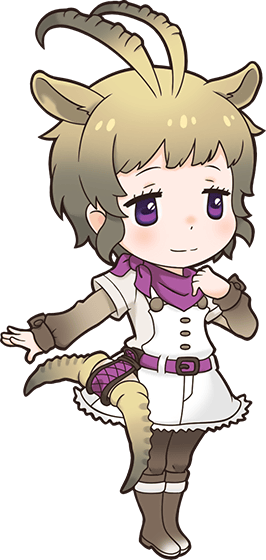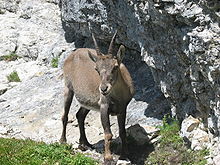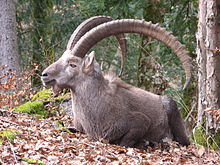Alpine Ibex: Difference between revisions
No edit summary |
(It's rare that we get to add a trivia quip like this. Could become outdated if Alpine Ibex is redesigned some day. Will be back to edit down that IRL section some more.) |
||
| Line 14: | Line 14: | ||
}} | }} | ||
{{FriendBuilder | {{FriendBuilder | ||
|introduction={{quote| | |introduction={{quote|... I like doing nothing. But, if I see a climbable wall, I'll unconsciously climb it. Ah, if I find climbable cliff. If it's about this height, you do it like this, quickly climb it... ... Alright, I arrived at the summit, I worked up a nice sweat!|Alpine Ibex's introduction}} The '''Alpine Ibex''' is a bovid [[Friend]] that appeared in the original Kemono Friends mobile game. | ||
|appearance=Alpine Ibex has short brownish grey hair which is cut very close to the head, with the hair left long enough to | |appearance=Alpine Ibex has short brownish grey hair which is cut very close to the head, with the hair left long enough to pass the fringe. She has small, feather-like hairs on the topmost head spot, representing the female alpine ibex's horns. She has purple eyes, and judging by her facial expression, she seems relaxed. | ||
Alpine Ibex wears a white sleeveless coat dress which has five buttons, three of them vertically aligned on the belly and two of them on her chest. Her coat has a purple belt which slightly extended to her right to hold horns which have the shape of a boomerang. The coat's edges have white fur. | Alpine Ibex wears a white sleeveless coat dress which has five buttons, three of them vertically aligned on the belly and two of them on her chest. Her coat has a purple belt which slightly extended to her right to hold horns which have the shape of a boomerang. The coat's edges have white fur. | ||
| Line 22: | Line 22: | ||
As with most of the Friends, she has the ears of the animal she's based on. | As with most of the Friends, she has the ears of the animal she's based on. | ||
|t0=No | |||
|t1=Yes | |||
|nxnrole=Minor character, obtainable | |||
|t2=No | |||
|t3=No | |||
|t4=No | |||
|t5=No | |||
|t6=No | |||
|t7=No | |||
|t8=No | |||
|t9=No | |||
|t10=No | |||
|t11=No | |||
|t12=No | |||
|t13=No | |||
|t14=No | |||
|t15=No | |||
|t16=No | |||
|t17=No | |||
|t18=No | |||
|t19=No | |||
|t20=No | |||
|t21=No | |||
|t22=No | |||
|t23=No | |||
|t24=No | |||
|t25=No | |||
|t26=No | |||
|t27=No | |||
|t28=No | |||
|reallife=[[File:Alpine_Ibex_Female.jpg|thumb|upright=1.0|left| Female Alpine Ibex(Capra ibex)]] | |reallife=[[File:Alpine_Ibex_Female.jpg|thumb|upright=1.0|left| Female Alpine Ibex(Capra ibex)]] | ||
The | The alpine ibex ''(Capra ibex)'', also known as the ''steinbock'' or ''bouquetin'', is a species of [[Wikipedia:Wild goat|wild goat]] that lives in the mountains of the European Alps. There are five species of ibex, according to the Integrated Taxonomic Information System (ITIS). They have long, curved horns and cloven hooves. Males have long beards. | ||
Alpine | Alpine ibex typically inhabit open, rocky habitats at high altitude, above the tree line. Steep, south-facing slopes with rugged topography and grassy vegetation are preferred. Below the tree line, at sub-alpine levels, ibexes are only found in open, sunny woodland interspersed with rocky outcrops. | ||
The | The ibex is a species of wild mountain goat that have huge back-curving horns. Both male and female alpine ibex have these large, backwards-curving, horns with numerous ridges along their length, those of the males are substantially larger than those of females which are slightly shorter, thinner and curve slightly more backwards. Horns are used to defend themselves against predators. Ibex are herding animals which are subject to a wide variety predators. Eagles, bears, leopards and humans all play significant roles in regulating the ibex population. | ||
Being able to climb to great heights is also an Ibexes defence technique as very few predators can follow them to the steepest regions of their habitat. Ibexes are very nimble. They can jump more than 6 feet (1.8 meters) straight up without a running start. This helps them climb mountainous terrain with ease. | Being able to climb to great heights is also an Ibexes defence technique as very few predators can follow them to the steepest regions of their habitat. Ibexes are very nimble. They can jump more than 6 feet (1.8 meters) straight up without a running start. This helps them climb mountainous terrain with ease. | ||
Ibexes are herbivores; they only eat vegetation, such as shrubs, bushes and grasses. Grazing accounts for a significant part of their eating habits. The low nutritional value of their diet means the | Ibexes are herbivores; they only eat vegetation, such as shrubs, bushes and grasses. Grazing accounts for a significant part of their eating habits. The low nutritional value of their diet means the ibex must spend much of the day eating. These browsers and grazers become active in the afternoon and into the evening and feed throughout the night in the forest, returning to the rock cliffs in the morning. In the spring the animals migrate back into the mountains to new feeding areas. In the winter, when the snow is deep and the weather is severe, they migrate down to south facing slopes which have more food and less snow. | ||
Although the species is not considered threatened at present, there is concern regarding genetic diversity, the founder effect and minimum viable populations. The | Although the species is not considered threatened at present, there is concern regarding genetic diversity, the founder effect and minimum viable populations. The alpine ibex is listed and is protected under national legislation in most range states. It occurs in a number of protected areas and it has been the subject of intensive conservation management in the form of reintroductions. | ||
|trivia=[[File:Alpine_Ibex_Male.jpg|thumb|upright=1.0|right| Male | |trivia=[[File:Alpine_Ibex_Male.jpg|thumb|upright=1.0|right| Male alpine ibex (Capra ibex).]] | ||
* As a browser, this ibex probably | * As a browser, this ibex probably regulates local vegetation growth. As a prey species, it is likely that the availability of ibex impacts the populations of predators. In this way, the alpine ibex is likely a keystone species within its environment. | ||
* In the eighteenth century, some Europeans believed ibex were magical. Today's equivalent of the magical ibex is the zodiac sign Capricorn. | |||
* In the eighteenth century some Europeans believed ibex were magical. Today's equivalent of the magical ibex is the zodiac sign Capricorn. | *Alpine Ibex, [[Nubian Ibex]] and [[Himalayan Tahr]] are the only three weapon-carrying bovid Friends to not carry double-headed spears as their armaments. | ||
**The three aforementioned Friends are, genetically, closely related; all hail from the bovid family's ''Caprinae'' subfamily, and fall within the ''Caprini'' tribe thereof. Alpine and Nubian Ibex belong to the ''Capra'' genus, while Himalayan Tahr comes from ''Hemitragus''; these genii directly diverged from one another and are not known to have diverged since. | |||
|reference=1. "[http://www.iucnredlist.org/details/42397/0 Capra ibex]". IUCN Red List of Threatened Species. | |reference=1. "[http://www.iucnredlist.org/details/42397/0 Capra ibex]". IUCN Red List of Threatened Species. | ||
Revision as of 08:29, 23 March 2024
Alpine Ibex
| |||
|---|---|---|---|
| アイベックス | |||
| Character Data | |||
| AKA | Ibex
| ||
| Romaji | Aibekkusu
| ||
| Debut | Kemono Friends (2015 Game) | ||
| Animal Data | |||
| Scientific Name | Capra ibex
| ||
| Distribution | Alps
| ||
| Diet | Herbivore
| ||
| Avg. Lifespan | 10-18 years
| ||
| Read More | Alpine ibex
| ||
| Conservation | 
| ||
| Alpine Ibex | Nexon Game |
“... I like doing nothing. But, if I see a climbable wall, I'll unconsciously climb it. Ah, if I find climbable cliff. If it's about this height, you do it like this, quickly climb it... ... Alright, I arrived at the summit, I worked up a nice sweat!”
—Alpine Ibex's introduction
The Alpine Ibex is a bovid Friend that appeared in the original Kemono Friends mobile game.
Appearance
Alpine Ibex has short brownish grey hair which is cut very close to the head, with the hair left long enough to pass the fringe. She has small, feather-like hairs on the topmost head spot, representing the female alpine ibex's horns. She has purple eyes, and judging by her facial expression, she seems relaxed.
Alpine Ibex wears a white sleeveless coat dress which has five buttons, three of them vertically aligned on the belly and two of them on her chest. Her coat has a purple belt which slightly extended to her right to hold horns which have the shape of a boomerang. The coat's edges have white fur.
Inside her coat, she wears a brownish grey blouse with sleeves extending to her arms with each cuff closed with one button. She wears black tights, and boots which have a white line around the upper part. Around her neck, she bears a purple bandana.
As with most of the Friends, she has the ears of the animal she's based on.
Series Appearances
| Media | Role | |
|---|---|---|
| 2015 | Nexon Game | ↪ Minor character, obtainable |
In Real Life
The alpine ibex (Capra ibex), also known as the steinbock or bouquetin, is a species of wild goat that lives in the mountains of the European Alps. There are five species of ibex, according to the Integrated Taxonomic Information System (ITIS). They have long, curved horns and cloven hooves. Males have long beards.
Alpine ibex typically inhabit open, rocky habitats at high altitude, above the tree line. Steep, south-facing slopes with rugged topography and grassy vegetation are preferred. Below the tree line, at sub-alpine levels, ibexes are only found in open, sunny woodland interspersed with rocky outcrops.
The ibex is a species of wild mountain goat that have huge back-curving horns. Both male and female alpine ibex have these large, backwards-curving, horns with numerous ridges along their length, those of the males are substantially larger than those of females which are slightly shorter, thinner and curve slightly more backwards. Horns are used to defend themselves against predators. Ibex are herding animals which are subject to a wide variety predators. Eagles, bears, leopards and humans all play significant roles in regulating the ibex population.
Being able to climb to great heights is also an Ibexes defence technique as very few predators can follow them to the steepest regions of their habitat. Ibexes are very nimble. They can jump more than 6 feet (1.8 meters) straight up without a running start. This helps them climb mountainous terrain with ease.
Ibexes are herbivores; they only eat vegetation, such as shrubs, bushes and grasses. Grazing accounts for a significant part of their eating habits. The low nutritional value of their diet means the ibex must spend much of the day eating. These browsers and grazers become active in the afternoon and into the evening and feed throughout the night in the forest, returning to the rock cliffs in the morning. In the spring the animals migrate back into the mountains to new feeding areas. In the winter, when the snow is deep and the weather is severe, they migrate down to south facing slopes which have more food and less snow.
Although the species is not considered threatened at present, there is concern regarding genetic diversity, the founder effect and minimum viable populations. The alpine ibex is listed and is protected under national legislation in most range states. It occurs in a number of protected areas and it has been the subject of intensive conservation management in the form of reintroductions.
Trivia
- As a browser, this ibex probably regulates local vegetation growth. As a prey species, it is likely that the availability of ibex impacts the populations of predators. In this way, the alpine ibex is likely a keystone species within its environment.
- In the eighteenth century, some Europeans believed ibex were magical. Today's equivalent of the magical ibex is the zodiac sign Capricorn.
- Alpine Ibex, Nubian Ibex and Himalayan Tahr are the only three weapon-carrying bovid Friends to not carry double-headed spears as their armaments.
- The three aforementioned Friends are, genetically, closely related; all hail from the bovid family's Caprinae subfamily, and fall within the Caprini tribe thereof. Alpine and Nubian Ibex belong to the Capra genus, while Himalayan Tahr comes from Hemitragus; these genii directly diverged from one another and are not known to have diverged since.
References
1. "Capra ibex". IUCN Red List of Threatened Species.
2. "Facts About Ibex". Live Science.
3. "Capra ibex". Animal diversity Web.
4. "Alpine Ibex (Capra ibex)". Animal Corner.


